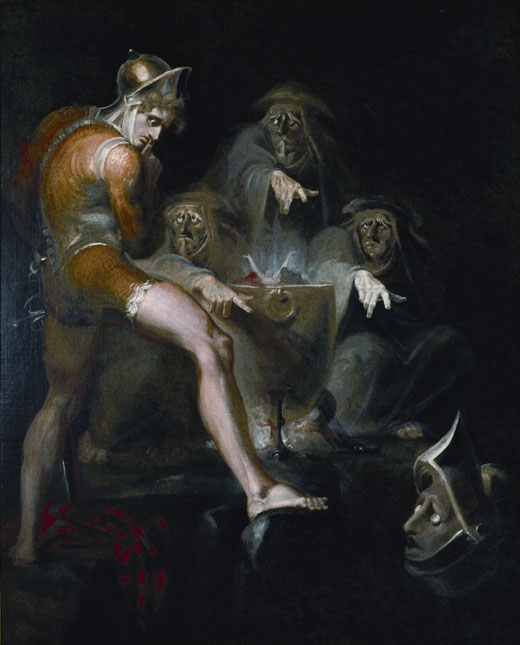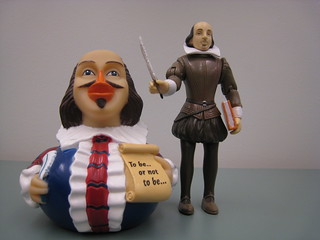Or, Why Teach Shakespeare to Georgia Tech Undergraduates?
This is the third term I’ve used early moden drama as the theme for my 1102 classes. In fall 2011 I taught a course on London City Comedy (The Shoemaker’s Holiday, The Knight of the Burning Pestle, Bartholmew Fair); last spring I co-taught a survey with Tom Lolis (A Midsummer Night’s Dream, Macbeth, Richard III, Titus Andronicus); this fall it’s a history genre focus (Henry IV, Parts 1 & 2, Henry V). I often justify my choice of topic by pointing out that drama as we now engage with it provides some very good hooks for the WOVEN approach to writing and communication we embrace in the Georgia Tech Writing & Communication Program. I also gratefully explain that by incorporating one of my major research fields into my syllabi I can demonstrate that I have experience teaching in that field (a not so subtle nod, that, to job market anxieties). And frankly I love this stuff and I’m good at transferring my enthusiasm to students. I do dancing pony really well. But is justification and self-gratification enough? Why is it important that Georgia Tech’s undergraduates experience Shakespeare and other historical and/or other canonical drama and literature in a composition setting?
Every term some of my student evaluations read, “I still hate Shakespeare but Dr. J made it fun.” I’m glad I make it fun, even though it is disappointing that to them the idea of reading/watching Shakespeare is still equivalent to eating lima beans (fill in appropriate alternate dreaded vegetable here.) But I have to remember that these are students who will never take another English course in their university careers, and that to them this is a only a milestone that they must pass in order to graduate. I know that when students prioritize their schoolwork, ENGL 1102 assignments often move to the bottom of the list. This, compounded by their presumption that early modern English (not Old English, dammit!) is arcane and that the themes and structure of 16th and 17th century plays are irrelevant to modern societal experience, inevitably makes teaching the plays that I enjoy a challenge. So what’s the point?
Short answers (aka truisms):
1) We haven’t really changed much at all in 400 years, and what mattered in London in 1599 matters in Atlanta in 2012. The human condition – full stop.
2) While English is a dynamic language it hasn’t really changed *that* much in 400 years. And if a student is reading this, no – Londoners did not strut around chatting each other up in iambic pentameter. The reason so many of Shakespeare’s words and phrases have remained in our lexicon is that they still work as the language evolves.
3) Theatre is cathartic.
Longer answers:
1) “There are more things in heaven and earth, Horatio, / Than our dreamt of in your philosophy.” (Hamlet, 2.i.162-3) I believe we have an obligation, as teachers, to push our students to engage with the abstract, the unexpected, the unfamiliar, the sublime. We need theatre – we need literature – to make better sense of the universe.
2) “You have witchcraft in your lips, Kate.” (H5, 5.ii.275) The language with which Shakespeare and his collaborators wooed audiences is magical. That students struggle to make sense of what they read and hear is important. Language shouldn’t be easy. We should wrestle with how to articulate and make sense of our emotions and experiences. We should feel excited when we recognize that someone else has been able to express those emotions and experiences in ways that work for us.
3) “Onions have layers. Ogres have layers. Onions have layers. You get it? We both have layers.” (Donkey, Shrek) It’s all entertainment. Apprentices stood in the pit at the Globe for the same reasons we line up at the multiplex to see “The Avengers” in 3D or fire up the DVR to catch the latest episode of “The Big Bang Theory” or hunker down with our XBoxes. It’s a copout for students to put Shakespeare on some Olympian pedestal. Early modern playwrights were providing the same dopamine-triggers that Joss Whedon and Bill Prady and the guys at Lego Videogames do for us. Take that, Harold Bloom!
When a group of students makes a connection between Lavinia’s rape in Titus Andronicus and the devastating violence against women in the Congo; when a civil engineer recognizes an affinity with Fluellen, Macmorris, Jamy and Gower digging tunnels under Harfleur in Henry V; when another freaks out at the triage nurses from hell … urm … witches in Rupert Goold’s 2010 production of Macbeth starring Sir Patrick Stewart I know that what I teach them is relevant – is important – is going to stay with them as they move away from ENGL 1102 into their own tragical-comical-historical-pastoral lives.
But that’s just what I’m thinking about on a Sunday morning when I should be marking essays (on Henry V) and preparing tomorrow’s lesson plan.



Pingback: Respite from the Grading Trenches | Diane Jakacki
Pingback: Student Digital Edition ~ Observations | Diane Jakacki